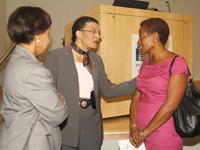|
by Cindy Abole
Public Relations
Veteran, family
medicine physician and health care
advocate Jeannette E. South-Paul, M.D., is
passionate about diversity issues and
addressing health care disparities.
South-Paul was an
invited guest to MUSC on Sept. 24, meeting
with faculty and staff from the Department
of Pathology and Laboratory Medicine. She
also addressed a larger campus crowd as
part of the College of Medicine Diversity
Committee and the Academy of Medical
Educators and Faculty Affairs' guest
speaker.
 University
of Pittsburgh's Dr. Jeannette South-Paul
chats with the College of Medicine's Dr.
Deborah Deas, right, and Department of
Family Medicine's Dr. Wanda Gonsalves,
following her Sept. 24 faculty
presentation held at the Drug Discovery
Building auditorium. University
of Pittsburgh's Dr. Jeannette South-Paul
chats with the College of Medicine's Dr.
Deborah Deas, right, and Department of
Family Medicine's Dr. Wanda Gonsalves,
following her Sept. 24 faculty
presentation held at the Drug Discovery
Building auditorium.
South-Paul, who is the
Andrew W. Mathieson Professor and chair of
the Department of Family Medicine at the
University of Pittsburgh, shared her
perspectives about America's current
health care status and health care reform.
She also emphasized how reform can reduce
inequities, lower costs and improve
overall medical care for everyone.
South-Paul believes that strengthening
primary care services will achieve better
health outcomes, improve quality patient
experiences and provide an efficient use
of resources through the presence of a
primary care physician.
According to research
studies, adults with a primary care
physician, rather than a specialist, have
33 percent lower costs of care and are 19
percent less likely to die. In the U.S.,
an increase of just one primary care
physician is attributed to 1.44 fewer
deaths per 10,000 persons.
According to
South-Paul, about 50 percent of people
diagnosed with chronic illness have
multiple conditions and suffer from
deficiencies in the management of their
disease such as diabetes, depression,
heart disease, asthma and other diagnoses.
She introduced the benefits of a chronic
care model that's integrative and involves
patients, physicians and the health
system.
To support this model,
South-Paul is a proponent of community
health centers and patient-centered
medical homes to provide comprehensive
health care services, especially among
vulnerable populations.
She also emphasized the
diversity of teams within academic health
centers. At MUSC and other academic health
centers and clinical organizations, it is
the role of health educators to prepare
health care professionals and provide
services to meet the needs of a diverse
patient population, especially the
underserved and disabled.
"Mostly, we want to
develop professionals that can provide
care and improve the health care
experiences for all patients," she said.
A native of
Philadelphia, South-Paul is also the first
African-American and first woman to hold
her post among medical schools across the
nation.
Prior to joining the
University of Pittsburgh in 2001, she
served as a family physician in the U.S.
Army for 22 years and was chair of the
Department of Family Medicine in the
Uniformed Services University of the
Health Services. She is an active
practitioner maintaining a family medicine
practice at the UPMC Matilda Theiss
Clinic.
Friday, Oct.
26, 2012
|



 University
of Pittsburgh's Dr. Jeannette South-Paul
chats with the College of Medicine's Dr.
Deborah Deas, right, and Department of
Family Medicine's Dr. Wanda Gonsalves,
following her Sept. 24 faculty
presentation held at the Drug Discovery
Building auditorium.
University
of Pittsburgh's Dr. Jeannette South-Paul
chats with the College of Medicine's Dr.
Deborah Deas, right, and Department of
Family Medicine's Dr. Wanda Gonsalves,
following her Sept. 24 faculty
presentation held at the Drug Discovery
Building auditorium.